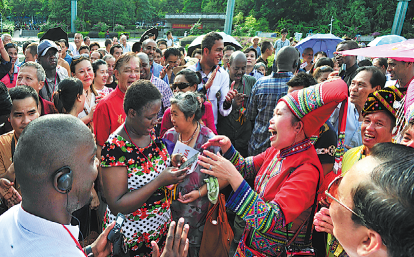Guangxi aims to be pathway to Asean
 |
|
Foreign visitors learn to sing folk songs of the Zhuang people in Guangxi.[Photo provided to China Daily] |
Thriving tourism
Located in the southern part of China, Guangxi Zhuang autonomous region is famous for its natural scenery of karst land forms, which are stunning geological features created on the Earth's surface by water draining into the ground.
The Beibu Gulf Economic Zone in the south of the region has islands, beaches and waterfalls, making it a beautiful and tranquil spot for holidaymakers.
Natural beauty
In 2013, the National Development and Reform Commission of China released a strategy to build Guilin into an international tourist destination.
The plan bids to develop Guilin as a world-class tourist destination as well as a platform for international tourism cooperation and culture exchanges by 2020.
Guilin, with its stunning Lijiang River, which originates in the city's Maoer Mountain, is a beautiful place that attracts numerous tourists from all over the world.
The city was visited by Queen Margrethe II of Denmark in 1979 and Bill and Hillary Clinton in 1998, all of whom extolled its wonders.
Ethnic culture
The local Zhuang people have a rich tradition of both written and unwritten folk stories, which often take the form of songs. The third day of the March in the lunar calendar is their traditional folk song festival, called San Yue San (Third Month's Third Day).
Every year, Zhuang people, along with the local Han, Yao, Miao and Dong peoples, gather together to sing folk songs and play folk games.
The festival is marked by a four-day holiday throughout Guangxi, giving tourists a wonderful opportunity to experience local culture and color.
There are many stories about the origin of the event, but one of most popular features Liu Sanjie, the singing goddess of Zhuang legend.
Liu Sanjie became hugely popular among ordinary people by fighting the practices of oppressive landlords through her songs. It is said that the festival commemorates the day of her death.














